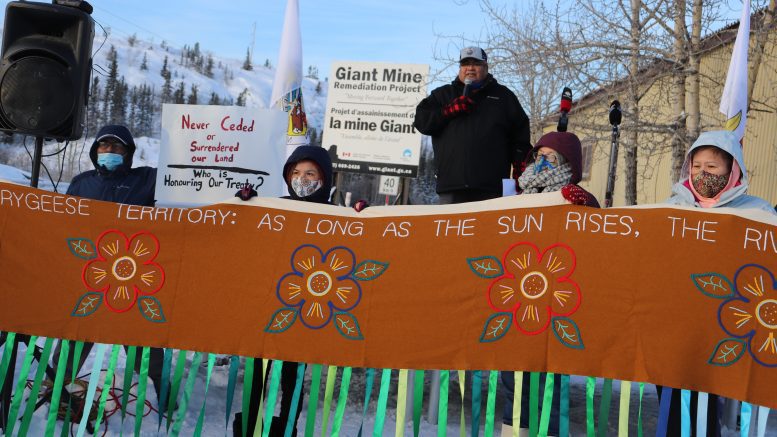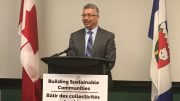The Yellowknives Dene First Nation (YKDFN) is less than thrilled with the response it received from the federal government regarding the petition for an apology and compensation for the negative effects of Giant Mine.
In a Monday press release, the First Nation highlighted shortcomings in the response, which came from Minister of Northern Affairs Dan Vandal.
“The Government’s response reflects some progress,” stated the release.
But the YKDFN’s issue with the response, according to the release, is that not enough is being done to set aside remediation contracts for them and that the response “repeats talking points they presented to media.”
Vandal’s response points to $45.8 million in contracts already awarded to the First Nation, but the release states these contracts were for care and maintenance of the site and not remediation. The contracts themselves were also not set aside for the benefit of the YKDFN, but had to be bid on often with joint partners through which the First Nation lost “considerable financial benefits.”
The response took particular issue with the aggregate supply contracts, which as being solicited by a standing offer process that “does not allow the Yellowknives Dene to effectively bid on this work.”
“The current process divides the opportunity into many smaller value contracts. As a result, the Yellowknives Dene are unable to make the investments in equipment and people necessary to take on this work.”
Det’on Cho Construction, a subsidiary of YKDFN, has previously proposed a quarry at Vee Lake with the hopes to provide aggregate to the remediation project.
In an email, YKDFN chief executive officer Jason Snaggs, said the YKDFN needed an anchor contract to overcome the upfront capital costs required to develop the quarry and justify the capital costs of assets, and with the current arrangement they would be bidding on contracts at a financial loss.
The YKDFN has also secured $817,771 from the Canadian Northern Economic Development Agency to be invested in procuring the necessary assets, the development of the quarry, and the development of YKDFN staff to actively participate in the work being performed.
Snaggs said discussions are ongoing with the federal government. “Further meetings with officials to discuss the work packages taking place in the coming weeks.”
Federal government response
Myranda Bolstad, senior communications advisor with Crown-Indigenous Relations and Northern Affairs, said that contracts for remediation activity cannot be set aside solely for a single First Nation’s benefit.
“The request for sole source subcontracts to be directly awarded to the Yellowknives Dene First Nation through the Main Construction Manager (Parsons) conflicts with the tendering procedures identified in the Main Construction Manager contract which are open, fair and transparent and align with the Government Contracts Regulations and Canada’s Contracting Policy.”
This request also conflicts with the Tłı̨chǫ land claim and self-government agreement.
In this agreement Canada must maximize the socio-economic benefits of the Tłı̨chǫ people, according to Bolstad.
“The Project has structured the socio-economic strategy to apply opportunities fairly to all Indigenous people in proximity to the project. This is in no way meant to diminish the importance of Canada’s commitment to reconciliation with the Yellowknives Dene First Nation.”
Request similar to Sydney Tar Ponds
In the petition, the YKDFN called on the federal government to set aside contracts similar to what the Mi’kmaq received for the Sydney Tar Ponds in 2005.
Bolstad said the Giant Mine Remediation Project proposed a Community Benefits Plan Agreement that commits Canada to reserve a number of work packages through the Main Construction Manager under the Procurement Strategy for Aboriginal Businesses (PSAB), and this is a similar approach to the tar ponds.
“To date, the Project has surpassed many of the Indigenous procurement metrics of that agreement,” she said.
“For example, the Sydney Tar Ponds agreement committed to reserve 5 per cent of contracts; whereas between December 2017 and November 2020 the Giant Mine Remediation Project has reserved 23 per cent under PSAB, or $15.8 million out of $70.2 million.”
She also said that while Indigenous contractors won 17.5 per cent of contracts for the Sydney Tar Ponds, YKDFN-affiliated businesses have been awarded 39 per cent of the total awarded contract value under the Giant Mine Remediation Project, or $212 million out of $540 million.
“The department continues to facilitate meetings between Public Services and Procurement Canada and the Yellowknives Dene First Nation for the purpose of discussing how Canada might further address the Yellowknives Dene First Nation’s procurement-related requests.”
Aggregate supply contract
As for the YKDFN’s request to receive a large “anchor contract” with aggregate supply for remediation, Bolstad said the contract was broken down so up to five local businesses could provide a relatively small amount of aggregate for “early, urgent remediation work.”
“(Parsons) is required to analyze market conditions and determine if sufficient capacity exists to tender through the (PSAB),” she said.
After this analysis, it was determined that local Indigenous businesses would not have this capacity and issued a request open to all businesses.
This approach was chosen to address the project’s immediate needs and would allow for local businesses to build the necessary capacity to competitively bid on larger aggregate work packages as needs are identified, she said.
Stakeholders were also promised remediation work would “ramp up” and there is insufficient time to re-tender these contracts, as the YKDFN has requested.
The petition, which was sponsored by NWT Member of Parliament Michael McLeod, garnered 32,192 signatures between December of 2020 and March of this year. It asked for an apology in permitting Giant Mine to open and the harm it caused to the Yellowknives Dene, compensation for harms done and ensuring the First Nation has a prominent role in the mine’s remediation.









